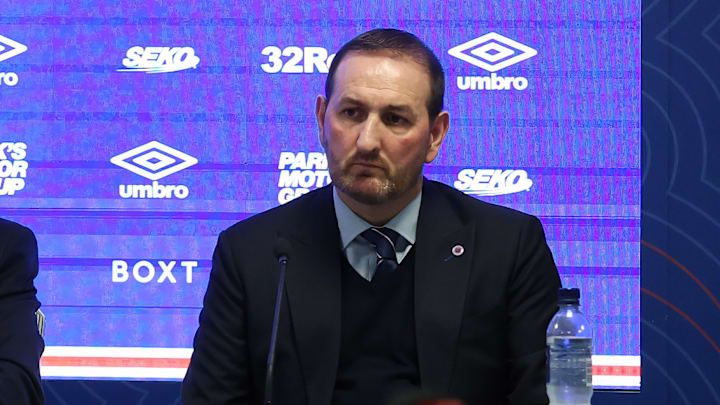Rangers Sporting Director Kevin Thelwell says he is “very pleased” with the direction of the club under new head coach Danny Röhl, insisting the team is finding rhythm on the pitch while major structural work continues behind the scenes at Ibrox.
Speaking to Rangers TV, Thelwell gave the clearest insight yet into how the football department is being rebuilt: from coaching and data to academy pathways and organisational structure. signalling a shift towards a more modern, long-term, 21st Century Rangers.
Röhl’s early work
Thrown straight into European football, a domestic semi-final and a demanding league schedule, Röhl has had little margin for adaptation.
But Thelwell believes the new head coach has handled the challenge exceptionally well.
“It’s never easy for a head coach to come in without a pre-season.
“I think he’s done really, really well,” he said.
He praised both the immediate lift in performances and the clarity of the team’s approach under Röhl, noting that three straight league wins have helped the squad “get into some sort of rhythm”.
Thelwell also highlighted the professionalism of Röhl’s staff, who have settled quickly despite joining during a congested run of fixtures.
Staff updates
Rangers have kept continuity with existing staff such as Rhys Owen and Sal Bibbo, while Röhl has added Sasha Lense and Matthias Kaltenbach to his coaching group.
Thelwell said all have “embedded themselves” well and have shown strong collaboration with the wider club.
He also confirmed the club intends to add a local coach with greater knowledge of the Scottish landscape, noting that the break in fixtures now gives the club space to finalise that decision.
“Let’s watch this space,” was his message.
Building a “Modern football department”
One of the most significant themes from Thelwell’s interview was Rangers shift toward a more analytical and structurally advanced football operation.
He spoke about the arrival of Jaymes Monte as the club’s first ever dedicated data specialist, a move designed to improve decision-making across recruitment, opposition analysis, coaching and sports science.
The Sporting Director also referenced the upcoming appointment of a Director of Football Operations, a role focused on governance, processes, logistics, transfer administration and the day-to-day running of the training facility.
He pointed to the appointment of Leanne Crichton as Women’s Head Coach and the imminent arrival of Jonathan Hunter-Barrett as Academy Director in the new year as further signs of a broader strengthening of the football department.
According to Thelwell, Rangers have taken a step back and asked themselves, “What does great look like?” - and are now building the structure to match that ambition.
Clarity on the club’s structure
Thelwell also offered rare clarity on how Rangers football hierarchy is designed to operate.
The Head Coach leads performance and has final say on signings. The Sporting Director oversees long-term strategy. The Technical Director focuses heavily on recruitment and talent identification. The Director of Football Operations will handle logistics, processes and administrative organisation.
These roles, Thelwell said, are designed to bring high-level expertise across the board and make Rangers “as efficient as we possibly can be”.
The pathway
With several youngsters already involved with European squads, and Findlay Curtis edging his way closer to regular first team football, Thelwell stressed that youth development must remain central to Rangers identity.
He said that big clubs must offer a pathway from academy to first team, and his own background in youth development makes this non-negotiable.
He also emphasised the importance of patience, referencing experiences from his time at Everton, and noted that Rangers must ensure their best young players can see a future for themselves at Ibrox.
He said: “If you’re one of our best talents, we don’t want you to leave.
“We want you to play for Glasgow Rangers.”
Transfer strategy
While homegrown prospects will always be prioritised, Thelwell made clear that Rangers must strengthen externally when necessary.
He believes players from Scotland often understand the club’s fabric and identity more deeply, but ultimately, Rangers must field an XI capable of winning.
Before signing anyone, he said, the club should always “look on the pitch next door” but acknowledge when outside additions are essential.
Thelwell also expressed pride at the number of Rangers players currently on international duty, calling it a significant achievement for both players and staff. But he made it clear the goal is for those players to return quickly, healthy, and fully focused on delivering for Rangers in domestic and European competition.
